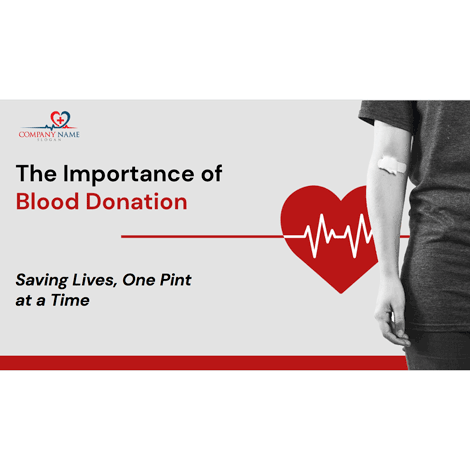- Featured
- Export Emails to Sheets
- Screenshot Tool
- Email Tracker
- MailKing - automated mass emailing
- Save Emails as PDF
- Export Emails to Google Docs
- Multi Email Forward
- Meeting Scheduler
- Email Templates
- All Apps
- Gmail Label Sharing
- Auto Bcc for Gmail
- Mobile Text Alerts for Gmail
- Save Emails to Google Drive
- Save Emails to Dropbox
- Auto Follow Up for Gmail
- Backup and Archive Emails to Amazon S3
- Free Video Email
- Gmail Web Clipper
- Send your Email to SMS
- Gmail Snippets
- Gmail Phone
- Email Zoom Text Reader
- Gmail Screencast
- HTML Editor for Gmail
- Notes for Gmail
- Rename Email Subject
- Gmail Free Online Polls & Surveys
- Schedule Emails
- Snooze Emails
- Share Emails as Links
- Gmail URL Link Preview
- Gmail Time Tracker
- Free Email Tracking Blocker
- Save and Backup My Emails
- Attach And Share Cloud Files for Gmail

Introducing our Blood Donation Google Slides template - a professionally designed and visually appealing tool for creating presentations on the topic of blood donation. This template features eye-catching graphics and easy-to-edit layouts, making it perfect for medical professionals, educators, and community advocates. With pre-designed slides for key topics like eligibility criteria, health benefits, and donor testimonials, this template will save you time and ensure your presentation is both informative and engaging. Whether you're promoting a blood drive, educating the public on the importance of donation, or presenting research findings, our Blood Donation Google Slides template is the perfect tool to help you communicate your message effectively.
1 of 10
The Importance of Blood Donation
Saving Lives, One Pint at a Time
2 of 10
Why Donate Blood?
Donating blood is important because it can help save lives. Blood is essential to our bodies, as it carries oxygen and nutrients to different parts of the body and removes waste products.
When someone loses blood due to injury or surgery, they may require a blood transfusion to replace the lost blood and restore their body's functions.
3 of 10
Who Can Donate?
Weight: Donors must meet the minimum weight requirement, which is typically around 110 pounds or 50 kilograms.
Health: Donors must be in good health and not have any active infections or illnesses.
Medications: Donors should not be taking certain medications that may affect their ability to donate blood, such as blood thinners or antibiotics.
Age: Donors must be at least 16 or 17 years old, depending on the country, and have parental consent.
4 of 10
Types of Blood Donations
Whole blood donation
Platelet
donation
This is the most common type of blood donation. During a whole blood donation, the donor gives approximately one pint of blood, which includes red blood cells, plasma, and platelets.
Platelets are small cells in the blood that help to form blood clots and stop bleeding. During a platelet donation, the donor's blood is passed through a machine that separates out the platelets, while returning the rest of the blood components back to the donor.
Plasma
donation
Plasma is a clear, yellowish liquid that makes up a significant portion of the blood. Plasma contains important proteins and clotting factors that are used to treat patients with bleeding disorders, such as hemophilia.
5 of 10
The Donation Process
How it works
Registration
Donors will be asked to provide some basic information, such as their name, address, and date of birth.
Health screening
Donors will undergo a health screening to ensure that they are eligible to donate blood.
Donation
Once the donor has been deemed eligible to donate blood, they will be asked to sit or lie down in a comfortable position.
Post-donation care
After the donation is complete, donors will be asked to rest for a few minutes and may be offered some refreshments, such as juice and snacks.
6 of 10
Benefits of Donating Blood
Improved cardiovascular health
Reduced risk of cancer
Feeling of altruism
Free health check
7 of 10
Blood Donation Facts and Statistics
1. Every two seconds, someone in the United States needs blood.
2. More than 41,000 blood donations are needed every day in the United States alone.
3. Only 7% of people in the United States have type O-negative blood, but it is needed in 100% of emergency situations.
4. Type AB-positive blood (the universal recipient) is the rarest blood type and is only found in about 3% of the population.
8 of 10
The Importance of Regular Donations
Regular blood donations are critical in helping to maintain an adequate supply of blood for those in need. Many patients require blood transfusions on a regular basis, such as those with cancer or blood disorders. Additionally, emergency situations can arise at any time, where a sudden need for blood can occur.
By donating blood regularly, individuals can help to ensure that there is a consistent supply of blood available for those who need it. Just one blood donation can help up to three people, and regular donations can have an even greater impact.
9 of 10
Anyone can be a HERO
Donate blood today!
You can help save a life!
If you are interested in donating blood, you can contact us directly. By donating blood or hosting a blood drive, you can help to save lives and improve the health of others in your community. Take action today and make a difference in the lives of those in need:
www.website.com
10 of 10
In conclusion, blood donation is a critical and lifesaving process that can help to improve the health of others.
Contact us
+1 (234) 567-8909
youremail@gmail.com
yourwebsite.com
388 Staghorn Ln
Wright City, Missouri(MO), 63390